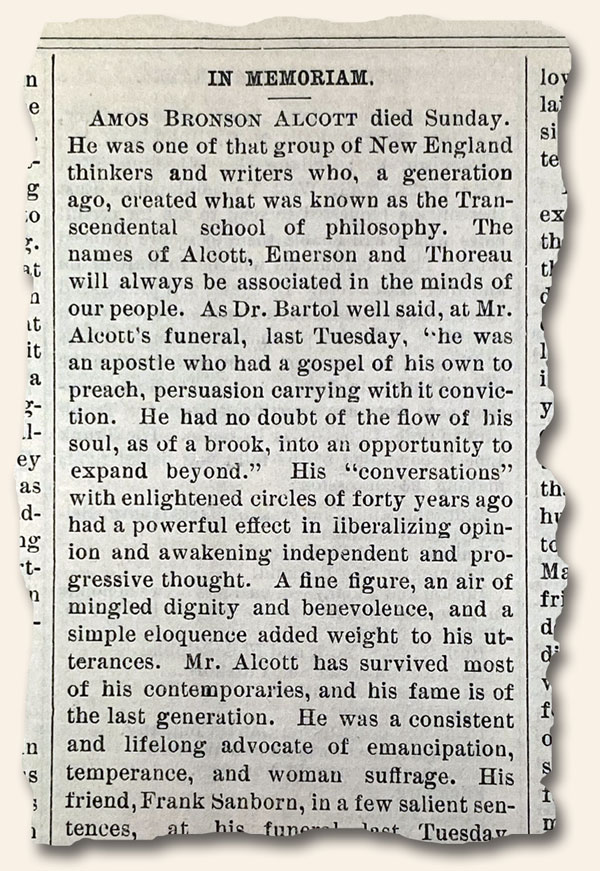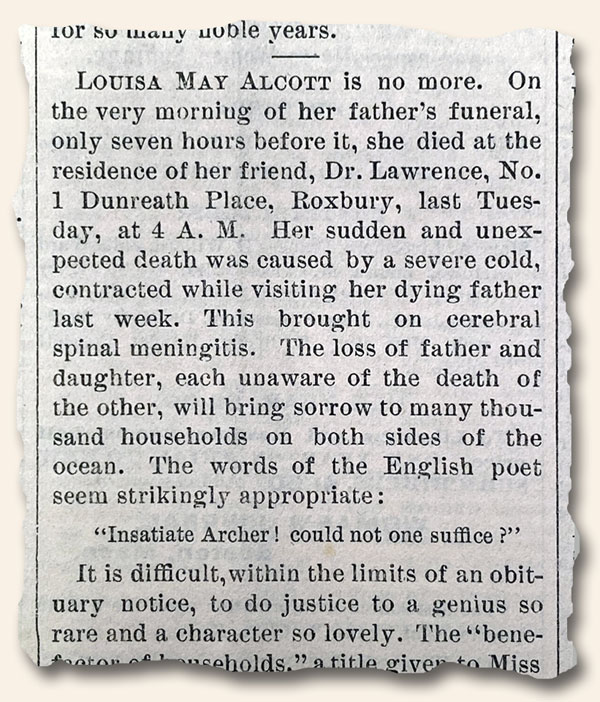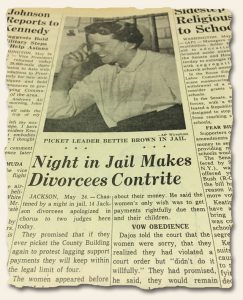Louisa May Alcott – a sad, but poetic death…
November 22, 2021 by Stephanie Williams · Leave a Comment
Today I found a gem as I was sorting through some volumes from the late 19th century. While this one might not have broad appeal, it was the highlight of my archive adventures. Within The Woman’s Journal dated March 10, 1888 is following editorial note by Lucy Stone:
To the editors of the WOMAN’s JOURNAL the death of Miss Alcott comes with a sense of personal bereavement. From the beginning she was a steadfast friend of the suffrage cause. She was always ready to serve it. Her cordial endorsement of it in many letters sent to be read at suffrage conventions, her repeated reaffirmation of her increasing conviction of the need of woman suffrage has been again and again like a tower of strength, or like the shadow of a great rock in a weary land. Millions of people on both sides of the ocean, whose lives her pen has enriched and made better, will hear with pain and sorrow of her untimely death.
From her home state newspaper, to which she was a regular subscriber, the details of her life and sudden departure from it are particularly poignant: “It is difficult, within the limits of an obituary notice, to do justice to a genius so rare and a character so lovely,” writes one contributor. However, the anecdotes and details that fill the paper attempt to do just that as they chronicle her life, her career, and the many efforts to enrich the lives of those around her. The author of Little Women, Little Men, Eight Cousins and so many other popular titles, became sick while visiting her father, Amos Bronson Alcott — the Transcendentalist teacher, writer, woman’s suffrage advocate and philosopher. To him, while a mere breath removed from her last, Louisa wrote, “Surely dear father some good angel or elf dropped a talisman in your cradle that gave you force to walk thro life in quiet sunshine while others groped in the dark…”.
Sadly, it was on the morning of his funeral that she passed away. Following the obituary for her father, the three-column tribute to the beloved author begins with a statement that is heart wrenching in its simplicity.
“Louisa May Alcott is no more.”

Snapshot 1870… The 15th Amendment – Not So Fast!
November 19, 2020 by GuyHeilenman · Leave a Comment
The 15th Amendment states: “The right of citizens of the United States to vote shall not be denied or abridged by the United States or by any State on account of race, color, or previous condition of servitude.” (www.History.com)
However…
Despite the amendment, by the late 1870s discriminatory practices were used to prevent blacks from exercising their right to vote, especially in the South. (www.History.com)
We recently unearthed a pair of issues from The New York Times dated in 1870 which shed some early-morning light on the dawn of the 15th Amendment, and the struggle it faced on its path to realizing its intent – a struggle which made significant headway with the passage of the Voting Rights Act in 1965.
The Constitution of the United States is second-to-none, and the wisdom of the Founders to frame it in such a way as to make it a work in progress was genius. However, making adjustments along the way, although appropriately difficult, was part of the original intent. The greater problem and most difficult hurdle is bringing the hearts of humanity in line with “red & yellow, black and white; they are precious in His sight” – and should be seen and treated as such. 
I’m New Here: Weeks Twenty-Two and Twenty-Three…
July 26, 2019 by Stephanie Williams · Leave a Comment
 Time seems to be advancing at an ever-increasing pace. Each day is crammed with more tasks than can possibly be accomplished; I think this means I am beginning to get the hang of things. But Monday brought me up short a bit as I searched titles tracing a particular story which initially diverted to the Freedom Ride. As intriguing as the tone in those accumulating reports of bus rides through the South was, the heading on a neighboring column wrested my eyes and my thoughts. I had to know the reason that divorcees (such a fancy and outmoded term) spent a night in jail. At least that’s what I believed at the time. However, since it has been four days since I read the report and I am still ready to sound forth at a moment’s reflection, it might have been better if I stuck to the familiar angst over bus seats allocated by color of skin.
Time seems to be advancing at an ever-increasing pace. Each day is crammed with more tasks than can possibly be accomplished; I think this means I am beginning to get the hang of things. But Monday brought me up short a bit as I searched titles tracing a particular story which initially diverted to the Freedom Ride. As intriguing as the tone in those accumulating reports of bus rides through the South was, the heading on a neighboring column wrested my eyes and my thoughts. I had to know the reason that divorcees (such a fancy and outmoded term) spent a night in jail. At least that’s what I believed at the time. However, since it has been four days since I read the report and I am still ready to sound forth at a moment’s reflection, it might have been better if I stuck to the familiar angst over bus seats allocated by color of skin.
In case accompanying photographs do not tell enough story, women went to jail because deadbeat dads (such a crass and modern term) did not pay court-ordered child support. Just that. The year was 1963, and I suppose I am not meant to expect much else from the era — particularly that the freedom to assemble could possibly, legally, be constrained to a total of four persons.
Because, that was the crux of the charges — the reason for the headline: Night in Jail Makes Divorcees Contrite. “They promised that if they ever picket the County Building again to protest lagging support payments they will keep within the legal limit of four.” Fifty-six years ago a woman who was not receiving justice promised by the legal system had to promise to forego rights granted in 1791 by the First Amendment, even as she attempted to bring pressure to bear on the powers that be. Of course, I’m not foolish enough to think that this tiny fragment that sparks my ire is as important than any of the other Civil Rights /liberties that seem to have too limited of a citizenry to whom they are applied. And I am fiercely glad that the group of four swelled to an angry mob of twelve, bringing so much havoc upon the town that these single mothers had to be jailed in order to preserve the peace. Perhaps they were granddaughters of those who marched for Suffrage . It may be that they were inspired by other heroes that brought about change. Because things are not the same today. Here it helps me to take in the 1963 newspaper as a whole, reading again of the laws that were eventually impacted by two different groups. In 2019, wearied with seemingly insurmountable conflict, offense, discrimination and outright hatred, the neighboring headline, “11 Riders Quietly Leave for Mississippi Test Run” provides some perspective. Multiple barriers to equality remain, but many have been knocked down. Many barriers have been knocked down, but perhaps some have been worn away through the centuries by those whose stories are woven through old newspaper pages, those who find their own, quiet, persistent way to push back.


